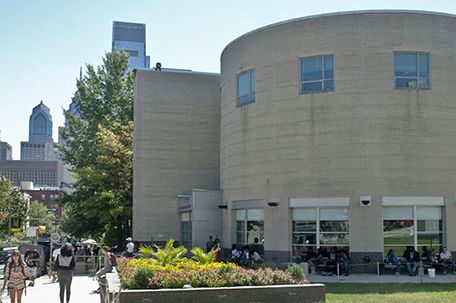
Written by Dr. Claudia Curry, director,
Women’s Outreach and Advocacy Center
Kimberly Daniel, director, KEYS program;
Paula Umaña, director, Single Stop and Dr. Guy Generals, Community College of Philadelphia president
A simple way to understand the relationship between poverty and success is to consider Maslow’s hierarchy of needs. Too often, the basic needs represented by the bottom rungs of the hierarchy prevent individuals from climbing out of poverty. One illness or financial hardship can distract a motivated individual from a goal.
At Community College of Philadelphia (CCP), we offer two suggestions: streamline the regulations that fund the support services that students need, and find ways to make the services more transparent. The College has multiple programs to offset challenges confronted by students in poverty. Three noteworthy examples are: Single Stop, the Women’s Outreach and Advocacy Center and the Keystone Education Yields Success program (KEYS).
The Single Stop program at CCP helps students’ with unmet financial needs by connecting them to public benefits. Single Stop helps students navigate systems that can be intimidating while also helping them learn to manage their time between work, school, and family responsibilities. In addition to assisting students with applications and troubleshooting processes, Single Stop staff provide financial counseling and connect students with emergency funds for housing and food resources, textbook and transportation assistance, and overall support when dealing with financial hardships.
Single Stop partners with local non-profits to provide key services like free tax preparation services, healthcare enrollment assistance, immigration consultations, and legal aid. Since its inception in 2013, Single Stop at CCP has helped more than 11,000 students access over $22.5 million in benefits and tax refunds. The results have been astounding: significant increases in semester-to-semester persistence, course completion, and higher grade point averages.
Similarly, the Women’s Outreach and Advocacy Center provides specialized services to all students and provides a forum where women can convene as a community for advocacy, collaboration, research, and education. The center further helps students with the challenges related to homelessness, domestic and sexual violence, and welfare reform. One of the notable challenges they face is the lack of affordable quality childcare which impedes the student’s capacity to complete their academic goals. In September 2018, CCP received a four year Department of Education grant to provide childcare access to student-parents from low – income backgrounds. The CCAMPIS program (Child Care Access Means Parents in Schools) offers stipends that are payable to accredited and licensed child care providers.
Without child care subsidies, student-parents struggle to enroll and remain in college. Our goal for the 2018 to 2022 CCAMPIS program is to enroll at least 40 eligible students annually, offer student success workshops, track progress, and retain at least 90 percent of students from semester to semester.
The KEYS program at CCP is a unique service that combines education with employment. The program is designed to afford individuals receiving TANF (Temporary Assistance for Needy Families) and SNAP (Supplemental Nutritional Assistance Program) benefits the opportunity to pursue college-level credentials. Those credentials are used as a springboard to employment with family- sustaining wages. In addition to food stamps and medical assistance, participants are eligible for financial allowances to assist in meeting the needs of student-parents. The allowances are for childcare, transportation, and book stipends; but also help pay for professional clothing, resources for employment and educational tools and supplies, certifications/licensing fees, and aid for criminal background reports.
KEYS emphasizes collaboration with the entire college community. The program also collaborates with County Assistance officesand continues to forge partnerships with employers and service providers in the Philadelphia Region. Since its inception, the KEYS program has enrolled more than 11,000 students.
What makes these three programs effective is the proximity to and familiarity that the programs have with one another and the degree to which the professionals are able to cooperate and coordinate their services on behalf of students. A maze of external program regulations keeps students from being aware of available services or not knowledgeable enough to take advantage of the services and dollars.
Community College of Philadelphia is committed to coordinating our efforts in and outside of our community to ensure that the city’s students receive the services they need to be successful students and, ultimately, successful employees.

















Leave a Comment